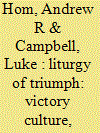|
|
|
Sort Order |
|
|
|
Items / Page
|
|
|
|
|
|
|
| Srl | Item |
| 1 |
ID:
188926


|
|
|
|
|
| Summary/Abstract |
Wartime is fundamentally important to the study of international politics but not especially well understood. In this paper, we use timing theory and the concept of liturgy to unpack the contemporary dynamics of US wartime. A theory of political timing posits that all temporalities derive from and symbolize underlying social processes, and that these timing efforts unfold according to a master organizing standard. Liturgy highlights the way that ritualized acts help participants commune with the sacred – whether this be God or the nation-state. Scrutinizing contemporary US culture practices, we combine these ideas to argue that the notion of victory, as enacted through a widespread set of performative routines, acts as an organizing standard that embeds and reifies wartime in US security policy and daily life. Prevalent ideals of winning wars gather together a stylized past, explicate present problems, and generate expectations about future problems and conflicts. We tabulate several highly influential examples of this liturgy of triumph from national calendars, commemorative sites and events, and cultural practices like spectator sports. In addition to normalizing a view of wartime as having clear beginnings and uniquely successful endings, the US liturgy of triumph highlights a growing gap in the country’s relationship to the use of force. Most of what performative war liturgies commemorate is ‘finished’; it has been seen, known, and ostensibly won. Yet, much of what defines 21st century conflict is anything but certain or victorious. Moreover, US victory culture has only grown more acute the longer the concrete victories fail to materialize, suggesting a tragic code at the heart of US security politics.
|
|
|
|
|
|
|
|
|
|
|
|
|
|
|
|
| 2 |
ID:
188923


|
|
|
|
|
| Summary/Abstract |
Wartime dominates the 21st century. The term is ubiquitous in contemporary politics, providing an intuitive trope for narrating foreign relations, grappling with intractable policy problems, and responding to shocking events. Such pervasion makes it easy to forget that wartime is a relatively recent political invention. It began as an instrumental and somewhat stylized concept that authorized exceptional violence by promising to contain it within strict temporal boundaries. Yet in the same era that wartime achieved international prominence, war itself became an increasingly ordinary and extended dimension of politics. Today, ‘wartime’ refers to a number of unconstrained and often self-perpetuating violent practices that have changed global politics and national security policies in deep and enduring ways – nowhere more so than in the United States. To introduce the special issue, this article presents wartime as a neglected and paradoxical topic at the heart of International Relations. It sketches the concept’s historical emergence, from innovative Presidential discourse through expansion in World War II and the Cold War, to 21st century entrenchment in daily life and habits of foreign relations. We also make the case for why US wartime marks an especially apt example of a global phenomenon, and one worthy of increased scrutiny within International Relations (IR). Finally, we provide synoptic summaries of the articles that comprise the special issue, showing how they work together to interrogate key aspects of 21st century wartime. We conclude with reflections on how the study of wartime may be extended to better understand its impact on historical and contemporary global politics.
|
|
|
|
|
|
|
|
|
|
|
|
|
|
|
|
|
|
|
|
|